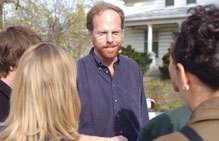
Dennis Jacobs tells a story that has a familiar ring: He wasn’t a particularly engaged elementary school student until his father, a fifth-grade teacher, brought him home a box of electronics components to take apart and put together.p. The thrill of figuring out how things worked sent Jacobs on a path that included doctoral studies at Stanford.p. One might also look to that exploratory impulse as the root of Jacobs’ most recent honor: the 2002 Carnegie U.S. Professor of the Year for research and doctoral universities. The award is sponsored by the Carnegie Foundation for the Advancement of Teaching and directed by the Council for Advancement and Support of Education. It is the only national award to acknowledge teaching excellence at the college level.p. Jacobs’ foray into the world of teaching excellence began with tinkering of sorts when he realized his Introductory Chemistry class was— well, not working properly. As Provost Nathan Hatch points out, Jacobs could have applied his attentions to the best students in the class. Instead, he became concerned about the problems of the one-third of the students who were struggling or failing. Using a variety of teaching practices such as collaborative learning, Jacobs created an experience with measurable success: Students in this section began to pass and excel; 50 percent of them took a second year of chemistry; a good portion of the students chose to major in science.p. In the process, Jacobs became an advocate of the Scholarship of Teaching and Learning (SOTL), the formal name of a movement in which professors examine, explore and measure the teaching and learning process with meticulous care— the attention to detail for which scholars are famous. The Carnegie Foundation is the nation’s foremost proponent of SOTL and encourages its growth through the prestigious Carnegie Fellows program. The foundation selected Jacobs for a fellowship as he worked through his Introductory Chemistry methodology.p. Since revitalizing the intro course, Jacobs has continued to explore the teaching and learning processes.p. “I used to approach teaching from the point of view of content: the material I felt I needed the students to learn,” Jacobs said. When he joined the Notre Dame faculty in 1988, he poured his heart into providing the most accurate, most up-to-date information. “But learning has little to do with listening to lectures and everything to do with inquiry and discovery,” he said. "Since my involvement in the scholarship of teaching and learning, I find I approach my job from the question, ‘How can I help these students learn?’ ‘’p. That question has continued to compel Jacobs. Two years ago, he and fellow chemistry professor Bradley D. Smith were commiserating over lunch about the difficulty of finding adequate textbooks. More than half a student’s learning time is spent out of the classroom, working with textbooks on homework assignments. Professors do their best to select good texts. Yet often, by the end of the semester, they find the book did not do the job. Textbook companies provide reviews of books. But Jacobs said he and Smith saw a missing element: “Nobody ever asks the student.”p. Smith and Jacobs created a survey that allows professors to identify the components they had sought in their textbook: readable text, communicative visuals, challenging homework assignments, and real world examples. Students then take an anonymous survey on whether the textbook supported those expectations. In sending the survey out the first time to friends in university chemistry programs, Jacobs and Smith uncovered a wellspring of interest. Two dozen chemists from nine universities returned 3,200 surveys, plenty of information for patterns to emerge.p. Last year, Jacobs and Bradley sought support from publishers to establish a free, Web-based national database and survey center. TextRev now is available to all at http://www.textrev.com. The plan is to recruit discipline-specific surveys— history book surveys written by historians, not chemists, for example. As faculty and student participation grows, the database will be able to provide answers to a broad spectrum of concerns, like the effectiveness of CD-ROM supplements, or a book’s success with a specific class profile, such as the older adults who enroll in commuter and community colleges.p. Jacobs learned in October that he would be honored as U.S. Professor of the Year, which would involve a trip Washington D.C. and media interviews. This required some schedule shuffling around his latest teaching inquiry: Can a community-based teaching experience inspire and solidify a student’s professionalism? Can such a course instill and support a sense of social justice?p. Called “Chemistry in the Service of the Community,” the course pairs students with staff from Memorial Hospital of South Bend in a project to reduce the threat of lead contamination to children. Students collect samples at local homes and, if the samples show unsafe lead levels, they work with homeowners to reduce the risks.p. The course, coordinated on campus in conjunction with the Center for Social Concerns, reminds Jacobs why he chose Notre Dame 14 years ago.p. “Notre Dame was a fit I wanted, a place where my concern was not just minds but hearts and souls,” he said. “Here, I balance my teaching responsibility and being a presence to students that can minister to the whole person.”
TopicID: 4031